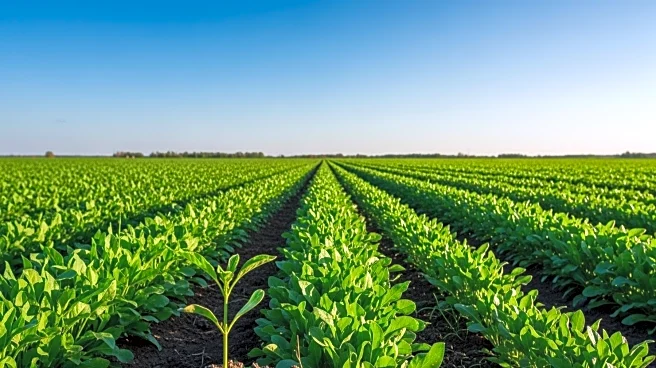What is the story about?
What's Happening?
A recent study led by Dr. Alison Carswell at Rothamsted Research highlights the detrimental effects of modern farming practices on soil resilience, which is crucial for maintaining global food supply chains. The study reveals that repeated use of practices such as plowing, irrigation, and fertilization can erode soil resilience over time, making it difficult for soil to recover from stressors like heat, drought, and floods. This erosion of resilience can lead to decreased fertility and structural collapse, posing a significant threat to food production. The study emphasizes the importance of maintaining soil health through practices like conservation tillage and integrated pest management, which can help slow down soil degradation and promote long-term productivity.
Why It's Important?
Soil resilience is vital for sustaining global food production, as soils support approximately 95% of food crops. The degradation of soil resilience not only threatens food security but also impacts climate change mitigation efforts, given that soils store a significant amount of carbon. The study underscores the need for sustainable farming practices to prevent further soil degradation, which could lead to increased erosion, nutrient imbalance, and contamination. These issues are already affecting one-third of global soils, according to the FAO. The findings highlight the urgency for farmers to adopt practices that enhance soil health, ensuring the stability of food systems and the environment.
What's Next?
Farmers are increasingly facing challenges due to changing soil conditions, rising input costs, and erratic weather patterns. As a result, there is a growing interest in adopting sustainable practices such as reduced tillage, cover crops, and precision irrigation. These methods have shown promise in maintaining crop yields while improving soil structure and organic matter. The study suggests that protecting soil resilience requires a shift in farming habits and precise management of resources. Future efforts will likely focus on educating farmers about sustainable practices and implementing policies that support soil conservation to safeguard food security and environmental health.
Beyond the Headlines
The erosion of soil resilience has broader implications beyond agriculture. It affects biodiversity, water quality, and carbon sequestration, all of which are critical for ecological balance. The study highlights the ethical responsibility of farmers and policymakers to protect soil health for future generations. Additionally, the economic impact of soil degradation could lead to increased costs for farmers and higher food prices for consumers. Addressing these challenges requires a collaborative approach involving research institutions, governments, and the agricultural industry to develop and promote sustainable soil management practices.

















